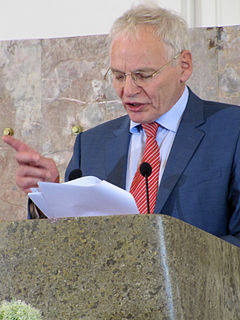A Quote by C. S. Lewis
Human beings judge one another by their external actions. God judges them by their moral choices.
Quote Topics
Related Quotes
"Judge not, that ye be not judge"... is an abdication of moral responsibility: it is a moral blank check one gives to others in exchange for a moral blank check one expects for oneself. There is no escape from the fact that men have to make choices; so long as men have to make choices, there is no escape from moral values; so long as moral values are at stake, no moral neutrality is possible. To abstain from condemning a torturer, is to become an accesory to the torture and murder of his victims. The moral principle to adopt... is: "Judge, and be prepared to be judged."
My message is to get human beings to love God, love their neighbor and for the life of me I just don't see the downside of human beings not being so mean to one another and actually care for one another and not steal from one another and not murder each other for their tennis shoes. That's the message I have.
And people who believe in God think God has put human beings on earth because they think human beings are the best animal, but human beings are just an animal and they will evolve into another animal, and that animal will be cleverer and it will put human beings into a zoo, like we put chimpanzees and gorillas into a zoo. Or human beings will all catch a disease and die out or they will make too much pollution and kill themselves, and then there will only be insects in the world and they will be the best animal.
We have to reformulate moral standards. Human beings have to impose limits on themselves when it comes to their actions and desires. There is a beautiful and very radical notion in the bible: Man is made in the image of God, no matter how sick, poor or damaged he is. We should try to transpose this maxim to our secular and constitutional self-image.



































